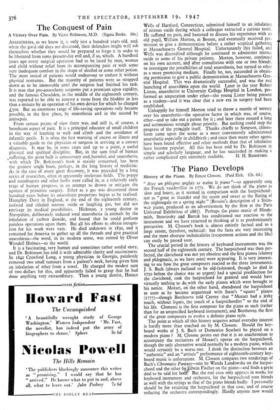The Conquest of Pain
A Victory Over Pain. By Victor Robinson, M.D. (Sigma Books. 16s.)
ANAESTHESIA, as we know it, is only just a hundred years old, and, when the gocd old days are discussed, their defenders might well ask
themselves whether they would be prepared to forgo it in order to be liberated from some present-day evil and, if so, which. A hundred years ago every surgical operation had to be faced by man, woman and child without relief from its accompanying pain or with some very inadequate comfort in the shape of alcohol or some other potion. The most stoical of patients would endeavour to endure it without physical restraints. But the majority of patients were so strapped down as to be immovable until the surgeon had finished his task. It is true that pre-anaesthetic surgeons put a premium upon rapidity, and the famous Cheselden, in the middle of the eighteenth century, was reported to be able to remove a stone from the bladder in less than a minute by an operation of his own device for which he charged
k500. But an enormous range of life-saving operations only became possible, in the first place, by anaesthesia and in the second by antisepsis.
From certain points of view there was, and still is, of course, a beneficent aspect of pain. It is a principal educator of small children in the way of learning to walk and climb and the avoidance of infantile perils. It is often the first warning of excess or illness and a valuable guide to the physician or surgeon in arriving at a correct diagnosis. It may be, in some cases and up to a point, a useful physical and spiritual discipline. But, in the sum total of human ,suffering, the great bulk is unnecessary and,harmful, and anaesthesia, with which Dr. Robinson's book is mainly concerned, has been the greatest single boon, perhaps, in the long history of medicine. As in the case of every great discovery, it was preceded by a long series of researches, often in apparently irrelevant fields. The poppy and mandragora and other herbs were called in, at a relatively early stage of human progress, in an attempt to drown or mitigate the agonies of primitive surgery. Ether as a gas was discovered three hundred years before its anaesthetic properties began to be realised. Humphry Davy in England, at the end of the eighteenth century, isolated and inhaled nitrous oxide or laughing gas, but did not envisage its medical possibilities. Hickman, a young doctor in Shropshire, deliberately induced total anaesthesia in animals by the inhalation of carbon dioxide, and found that he could perform painless operations upon them. But all his efforts to obtain recogni- tion for his work were vain. He died unknown in 1830, and it remained for America to gather up all the threads and give practical anaesthesia—the word, in its modern sense, was coined by Oliver Wendell Holmes—to the world.
It is a fascinating, very human and sometimes rather sordid story, and Dr. Robinson has told it with admirable clarity and succinctness. In 1842 Crawford Long, a young physician in Georgia, painlessly removed two small tumours from a patient's neck, having given him an inhalation of ether from a towel. He charged the modest sum of two dollars for this, and apparently failed to grasp that he had done anything very extraordinary. Then a young dentist, Horace Wells of Hartford, Connecticut, submitted himself to an inhalation of nitrous oxide during which a colleague extracted a carious tooth. He suffered no pain, and hastened to discuss his experience with an old pupil, William Morton, at Boston, and eventually received per- mission to give a demonstration before a rather sceptical gathering at Massachusetts General Hospital. Unfortunately this failed, and Wells was discredited although he continued to administer nitrous oxide to some of his private patients. Morton, however, continued on his own account, and after consultation with one or two friends, to investigate the possibilities of total anaesthesia, but turned to ether as a more promising medium. Finally he, too, succeeded in obtain- ing permission to give a public demonstration at Massachusetts Gen- eral Hospital. This was dramatically successful, and was the real launching of anaestedsia upon the world. Later in the year Robert Liston, anaesthetist at University College Hospital in London, per- formed an amputation under ether—the young Lister being present as a student—and it was clear that a new era in surgery had been established.
Unhappily for himself Morton tried to throw a mantle of secrecy over his anaesthetic—the operative factor in which was, of course, ether—and to take out a patent for it ; and later there ensued a long and acrimonious wrangle about priority. But nothing could stop the progress of the principle itself. Thanks chiefly to Simpson, chloro- form came upon the scene as a more conveniently administered anaesthetic especially in childbirth ; and since then many other agents have been found effective and other methods than that of inhalation have become popular. All this has been told by Dr. Robinson in simple and scholarly language, and he has succeeded in making a
rather complicated epic extremely readable. H. H. BASHFORD.


































 Previous page
Previous page